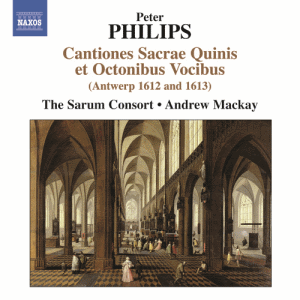 |
 |
|


alternatively
CD: MDT
AmazonUK
AmazonUS
Sound
Samples & Downloads |
Peter PHILIPS (1560/61
- 1628)
Cantiones Sacrae Quinis et Octonibus Vocis
Christus resurgens a 5 [3:45]
Disciplinam et sapientiam a 5* [2:27]
Loquebantur variis linguis a 5 [2:51]
Ne reminiscaris, Domine a 5* [2:52]
Gabriel angelus apparuit a 5* [3:07]
Viae Sion lugent a 5 [3:13]
Ave Jesu Christe a 8 [3:53]
Pater noster a 5* [3:40]
Beata Agnes a 5* [4:09]
Elegerunt Apostoli a 5* [3:21]
Media vita a 5* [3:40]
Ave Regina coelorum a 8 [3:38]
Ave gratia plena a 5* [3:00]
Ecce vicit Leo a 8 [3:50]
Ne timeas, Maria a 5* [1:53]
Gaude Maria virgo a 5 [3:07]
Virgo prudentissima a 5 [3:34]
Cum jucunditate a 5 [3:11]
Salve Regina a 5* [2:51]
Eia ergo a 5* [3:07]
 The Sarum Consort/Andrew Mackay; Nigel Gardner (organ)*
The Sarum Consort/Andrew Mackay; Nigel Gardner (organ)*
rec. 28 - 30 August 2000, Wardour Chapel, Tisbury, Wiltshire, UK.
DDD
Texts and translations available at Naxos website
 NAXOS 8.572832 [65:08]
NAXOS 8.572832 [65:08]
|
|
|
The name of Peter Philips is probably mostly associated with
music for keyboard. This part of his oeuvre has fared much better
in the hands of the recording industry than his vocal oeuvre.
The latter is far larger than his keyboard output, though. In
his article on Philips in New Grove John Steele even
states that "[the] heart of Philips' music undoubtedly lies
in his madrigals and motets". Considering its size and quality
it is hard to understand that only a relatively small part of
his vocal oeuvre has been recorded. It is also surprising that
this disc was released only in 2011, whereas the recording dates
from 2000. I don't know all the available recordings. However
I am not impressed by the interpretations I have heard. The
present disc is not going to change that, I'm afraid.
Peter Philips, who in all probability was a pupil of William
Byrd, left England for religious reasons. He stayed for some
time in Italy which had a lasting influence on his development
as a composer. He spent the largest part of his life in the
Spanish Netherlands, where from 1591 until his death he was
active as an organist and keyboard teacher. His first printed
collections of vocal music were devoted to the madrigal, published
in Antwerp between 1596 and 1603. In 1612 he published his two
collections of Cantiones Sacrae in 1612 and 1613. They
were reprinted in 1617 and 1625 respectively. In these new editions
he added a basso continuo part which shows that he was receptive
to the stylistic developments of his time.
The English poet Henry Peacham wrote that Philips' vocal music
"affecteth altogether the Italian vein". That comes to the fore
in the use of madrigalisms and word-painting as well as contrasting
rhythms. This should affect the interpretation, but unfortunately
that is not the case in this recording. Let me start by pointing
out some positive aspects. The motets are sung with one voice
per part. That is probably closest to common practice in Philips'
time, more than a performance with a large choir such as The
Choir of Trinity College, Cambridge whose recording was released
by Chandos in 2010 (reviewed
here). As Philips' motets are available with and without
basso continuo, it is up to interpreters whether to use an organ.
In this recording some motets are performed with organ, others
a cappella. The Latin texts are pronounced in a way which
could well reflect practice in Dutch-speaking Netherlands. It
is positive that Andrew Mackay has given this subject some thought.
Others are less careful in this respect.
That is as positive as I can be about this recording. Considering
its small size I am surprised that the voices don't blend really
well. That is partly due to the slight vibrato of most singers
which damages the ensemble. Another notable feature is the lack
of balance within the consort. The disc opens with the motet
Christus resurgens, and one could get the impression
that this is a piece for soprano solo. The other voices are
almost reduced to accompaniment. In many motets the upper voices
are too dominant. In Pater noster the soprano seems to
move independently from the other voices. Although this motet
has only one treble part and two bass parts, the soprano still
dominates. It has to be said, though, that the lower voices
have little presence anyway.
The text is seriously underexposed. In music which shows the
traits of the modern Italian style the words deserve much more
attention. There is also a reluctance to use dynamic shading
to underline some elements in the text. Generally these performances
are dynamically rather flat. An important aspect are the rhythms
which Philips often uses to single out episodes in the text.
These are not given sufficient attention. You have to listen
carefully to notice them, but I am sure that Philips wanted
them to be exposed more clearly, in order to communicate the
content. The madrigalism with which Ecce vicit Leo opens
is hardly noticeable.
I was severely disappointed by Trinity College Choir's performance,
and I have to say the same about this recording. One of the
most convincing recordings of Philips' vocal music is that by
Currende, directed by Erik Van Nevel (Accent, 1989). The Choir
of Westminster Cathedral is probably a bit too large for this
music, but in their recording (Hyperion, 1992) a number of motets
are performed with instruments doubling the voices. This is
a good option, because the participation of instruments was
common practice on the continent in Philips' time.
There is every reason for Philips' vocal music to be recorded
complete. Byrd's vocal oeuvre is also available on disc in its
entirety, so why not the same treatment for Philips? Unfortunately
this disc by The Sarum Consort falls short of doing him justice.
Johan van Veen
http://www.musica-dei-donum.org
https://twitter.com/johanvanveen
see also review by Robert
Hugill
|
|












